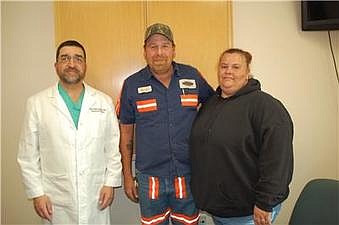In February 2018, Jonathan Lawson kept having pain in his lower back.
"I'm stubborn," said Lawson, who operates a towing company. "I don't like going to the doctor."
Who does?
Eventually, though, Melynda Lawson convinced her husband to go to the Tennova Healthcare-Shelbyville emergency room. The decision was none too soon; Jonathan Lawson got noticeably worse on the drive to the hospital, becoming sick to his stomach.
At the hospital, a CT scan revealed an inflamed appendix. Surgeon Navid Monajjem removed the appendix, and Lawson was back on his feet in just a few days. But with the removed appendix came bad news: a tumor.
Rare cancer
Monajjem consulted with other doctors and identified the problem as goblet cell cancer, an extremely rare form of cancer which starts in the appendix. The cancer had progressed far enough that even though the original tumor had been removed, it would be necessary to do another surgery to take out part of Jonathan's colon.
Monajjem tried to refer the Lawsons to Vanderbilt, but they wanted to stay in Shelbyville and have Monajjem do the procedure. The Lawsons have a good experience with the local hospital, and even though they live in Christiana, between Shelbyville and Murfreesboro, they would rather come to Tennova than go on to Murfreesboro or Nashville.
In June, Monajjem removed a segment of Jonathan Lawson's colon. The procedure appears to have been a complete success, and Lawson has required neither cancer treatments nor a colostomy bag. The Lawsons continue to follow up with oncologists, to make sure that the cancer is gone, and Jonathan will soon have a colonoscopy. But for now, everything looks good.
Lawson spent four days in the hospital for the colon surgery and was down for about 3 1/2 weeks total. He credits his recovery to Monajjem's resistance to using heavy narcotics during the recovery process.
"He didn't push pills on me," said Jonathan.
Few narcotics
It's part of a program called Enhanced Recovery After Surgery, or ERAS, that is being used not only for colon surgeries but for a variety of procedures. Limiting the use of narcotics can help benefit the recovery process as a whole, said Monajjem. For example, too many, or the wrong kind, of pain medicines can keep the colon from "waking up" after surgery.
ERAS doesn't mean that the patient doesn't receive any pain medicine or that pain isn't addressed. But narcotics are avoided whenever possible, in favor of other, non-narcotic medicines, and local anesthesia. Doctors discuss the expectations for pain with the patient and explain that there may be some pain as a consequence of the program. The different approach helps patients get out of bed the day of surgery, and become mobile sooner, and that mobility naturally helps reduce pain over time.
When cancer is involved, getting the patient mobile sooner also makes it possible to get them into cancer treatments when they are called for.
The Lawsons have nothing but effusive praise for Monajjem, saying that he advocated for them with the E.R. physicians at the start of the process and was helpful, supportive and informative throughout the experience.
"He's 100 percent hands-on," said Melynda.
"He's very protective of his patients," agreed Charisse Parker of Tennova Healthcare-Shelbyville, and CEO Bill Rich called Monajjem "a very humble person."
Be aware
March is Colorectal Cancer Awareness Month. Monajjem points out that colorectal cancer affects men and women. The National Institutes of Health says it's the second most deadly form of cancer after you eliminate gender-related cancers.
The risk of colon cancer makes screenings important. A colonoscopy, a procedure in which a camera is sent into the colon to look for polyps, is the typical form of colon cancer screening. For years, the commonly-accepted guideline was that for normal, healthy adults without a known risk for colon cancer, regular colonoscopies should start at age 50. Some sources are now recommending that such screenings begin earlier; the American Cancer Society now recommends that persons with normal risk get a screening at age 45. Ask your primary care physician what he or she thinks is appropriate for you.
A colonoscopy has one unique aspect when compared to other types of cancer screening, in that it can actually help prevent, not just detect, colon cancer. During a colonoscopy, doctors look for, and remove, growths called polyps. If a polyp is removed, it's tested to see if it's benign (non-cancerous) or cancerous. However, benign polyps have the potential to turn cancerous later on. So if a colonoscopy results in the removal of a benign polyp, it may, in theory, have prevented that patient from having colon cancer at some point in the future.
Many insurance companies will fully cover a screening colonoscopy (a colonoscopy for someone who isn't already diagnosed with colon cancer) separate from whatever deductibles or limits are on your policy. Contact your provider for the specifics of your coverage.
There are other forms of colon cancer screening, such as fecal tests, that are less invasive, but they must be done more often (and would have to be followed up with a colonoscopy anyway if the results were positive). Again, discuss your specific situation with your doctor.
